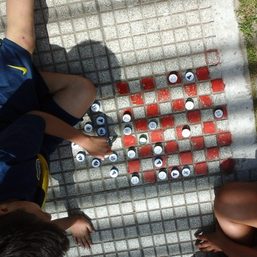SUMMARY
This is AI generated summarization, which may have errors. For context, always refer to the full article.

MANILA, Philippines – In another important ruling, the Supreme Court (SC) clarified that even mothers can be sued under Republic Act No. 9262 or the Anti-Violence Against Women and Their Children Act of 2004 (VAWC law).
The High Court’s En Banc, in an 18-page decision penned by Associate Justice Mario Lopez, granted the petition for certiorari filed by Randy Michael Knutson. The remedy – used to review a previous decision by a court – was filed by the father on behalf of his minor daughter.
Knutson’s petition for certiorari sought to challenge the Taguig City Regional Trial Court’s (RTC) ruling, which dismissed the father’s petition under the VAWC law for a Temporary and Protection Order. The petition was filed against Rosalino Knutson, the mother of Knutson’s daughter.
Aside from the certiorari, the SC also granted a permanent protection order in favor of the daughter.
In its decision, the SC ruled that the law also covers instances where mothers allegedly committed violent and abusive acts against their own children. “The fact that a social legislation affords special protection to a particular sector does not automatically suggest that its members are excluded from violating such law,” it said.
The court also noted that the definition of violence against women and children covers acts “committed by any person” – which means mothers are not excluded. The SC further explained that the law used the gender-neutral word “person” to pertain to the offender.
Section 3 of the law defining violence against women and their children “refers to any act or a series of acts committed by any person against a woman who is his wife, former wife, or against a woman with whom the person has or had a sexual or dating relationship, or with whom he has a common child, or against her child whether legitimate or illegitimate, within or without the family abode.”
“The Court refuses to be an instrument of injustice and mischief perpetrated against vulnerable sectors of the society such as children victims of violence. The Court will not shirk its bounden duty to interpret the law in keeping with the cardinal principle that in enacting a statute, the legislature intended right and justice to prevail,” the SC added.
Filing on behalf of children
In its ruling, the SC also noted that on behalf of children, fathers can file a complaint against allegedly abusive mothers. The High Court explained that even though the VAWC law does not include men as victims, it does not mean they cannot resort to remedies because of their gender identity, or because a father is not considered a “woman victim of violence.”
Aside from that, the SC pointed out section 9(b) of the law that allows “parents or guardians of the offended party” to file petition for protection orders. It was also incorporated in AM No. 04-10-11-SC or the Rule on Violence Against Women and Children, the High Court said.
On who can apply for protection orders, the SC said the law is clear when it used the word “parents” – which pertains to a father or a mother. It did not qualify who – between the mother and the father – can file a petition.
“There is no question that the offended party is [the daughter], a minor child, who allegedly experienced violence and abuse. Thus, [Knutson] may assist [his daughter] in filing the petition as the parent of the offended party,” the SC explained, adding that the father filed the petition “principally and directly for the protection of the minor child and not the father.”

The SC also said the RTC’s position that only children under the custody of a woman victim of violence can be protected by the VAWC law is a “restrictive interpretation.” According to the High Court, the position “will frustrate the position of the law to afford special attention to women and children as usual victims of violence and abuse.”
In addition, the SC said the RTC’s ruling would remove from the law’s coverage incidents where mothers are the actual abusers of their children, and that this would downgrade the Philippines’ commitment to eliminate all forms of violence, including those incidents perpetrated by the actual parents.
The RTC, in its decision, said that children who suffer abuse from their own mothers can invoke other laws, but the SC this is discriminatory.
“The supposed reassurance is an outright denial of effective legal measures to address the seriousness and urgency of the situation…[given that] only [the VAWC Act] created the innovative remedies of protection and custody orders. Other laws have no mechanisms to prevent further acts of violence against the child.”
What’s the case all about?
The father, on December 7, 2017, filed a petition for a Temporary and Protection Order on behalf of his daughter. He alleged that Rosalina, the mother of his child, placed their daughter “in a harmful environment deleterious to the latter’s physical, emotional, moral, and psychological development.”
However, the lower court dismissed the petition on the ground that protection orders cannot be issued against a mother who allegedly abused her own children. The RTC added that remedies under the VAWC cannot be applied to the father because he is not a “woman victim of violence.”
The father sought reconsideration from the RTC, but was also denied. This prompted him to bring the case to the High Court. – Rappler.com
Add a comment
How does this make you feel?
![[OPINYON] Diborsiyo sa mata ng isang anak](https://www.rappler.com/tachyon/2024/06/new-school-divorce-children-june-13-2024.jpg?resize=257%2C257&crop=294px%2C0px%2C720px%2C720px)






![[Two Pronged] I’m the eldest child. My parents make me discipline my siblings, so now I have a dysfunctional relationship with them.](https://www.rappler.com/tachyon/2024/06/tp-parenting-style.jpg?resize=257%2C257&crop=250px%2C0px%2C720px%2C720px)
![[Two Pronged] I found out that my 13-year-old son has been exchanging explicit photos with his girlfriend](https://www.rappler.com/tachyon/2024/05/teenagers-may-25-2024.jpg?resize=257%2C257&crop=416px%2C0px%2C1080px%2C1080px)
![[Two Pronged] I think my husband has depression but refuses to seek help, and now our kids are suffering](https://www.rappler.com/tachyon/2024/04/two-pronged-husband-issues.png?resize=257%2C257&crop_strategy=attention)





There are no comments yet. Add your comment to start the conversation.